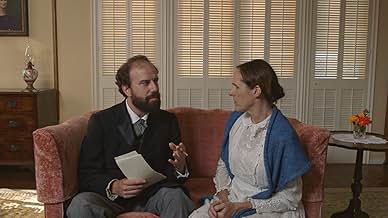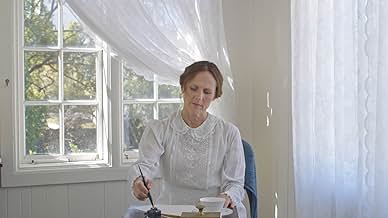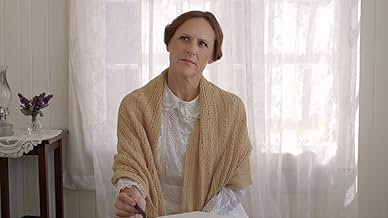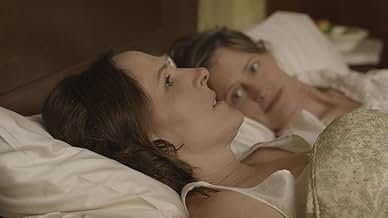VALUTAZIONE IMDb
6,2/10
1508
LA TUA VALUTAZIONE
Drammatizzazione del lato poco conosciuto della vita della scrittrice Emily Dickinson, in particolare della sua relazione con un'altra donna.Drammatizzazione del lato poco conosciuto della vita della scrittrice Emily Dickinson, in particolare della sua relazione con un'altra donna.Drammatizzazione del lato poco conosciuto della vita della scrittrice Emily Dickinson, in particolare della sua relazione con un'altra donna.
- Regia
- Sceneggiatura
- Star
- Premi
- 3 vittorie e 7 candidature totali
Stella Chesnut
- Mattie Dickinson
- (as Stella Chestnut)
John Peña Griswold
- Young Austin
- (as John Griswold)
Recensioni in evidenza
Wild Nights with Emily (2018) was written and directed by Madeleine Olnek.
It stars Molly Shannon as Emily Dickinson and Susan Ziegler as her sister-in-law, Susan Gilbert Dickinson.
The story comes to us in flashback, as narrated by Mabel Todd, portrayed by Amy Seimetz. Mabel lectures to women's groups, discussing Emily's poems and suggesting to them that Dickinson had a lesbian relationship with Susan.
It's clear that Mabel is a scheming opportunist. However, it's considered highly possible--in the movie and in real life--that Todd is correct.
The plot of the movie revolves almost entirely around the relationship of Emily and Susan. The film works because the actors are so good at presenting us with women in whom you can believe. It's wonderful to see two extremely talented actors bring their characters to life. (In her supporting role, Amy Seimetz does an excellent acting job as well.)
We saw this movie as in the Little Theatre as part of Rochester's ImageOut, the LGBT Film Festival. It will work well on the small screen.
The movie has a fairly weak IMDb rating of 7.0. However, it has been rated by less than 100 people, so it could still climb to a better position. I liked the film and highly recommend it.
It stars Molly Shannon as Emily Dickinson and Susan Ziegler as her sister-in-law, Susan Gilbert Dickinson.
The story comes to us in flashback, as narrated by Mabel Todd, portrayed by Amy Seimetz. Mabel lectures to women's groups, discussing Emily's poems and suggesting to them that Dickinson had a lesbian relationship with Susan.
It's clear that Mabel is a scheming opportunist. However, it's considered highly possible--in the movie and in real life--that Todd is correct.
The plot of the movie revolves almost entirely around the relationship of Emily and Susan. The film works because the actors are so good at presenting us with women in whom you can believe. It's wonderful to see two extremely talented actors bring their characters to life. (In her supporting role, Amy Seimetz does an excellent acting job as well.)
We saw this movie as in the Little Theatre as part of Rochester's ImageOut, the LGBT Film Festival. It will work well on the small screen.
The movie has a fairly weak IMDb rating of 7.0. However, it has been rated by less than 100 people, so it could still climb to a better position. I liked the film and highly recommend it.
"Wild Nights with Emily" is a biopic of the poet Emily Dickinson, based around what might be called a revisionist account of her life. The film starts from the assumption that traditional literary scholarship has tended to portray Dickinson, wrongly, as a shy, reclusive, virginal spinster whose poems were inspired by unrequited love for men. Its express purpose seems to be to correct this mistaken impression, showing her as a woman who enjoyed many friendships with other women and who had a long-lasting lesbian relationship with her friend Susan Gilbert.
According to this thesis Susan also became her sister-in-law, entering into a lavender marriage with Emily's brother Austin in order to have closer and easier access to Emily herself. (Austin and Susan had children together, so perhaps their marriage might not have been as lavender as the film makes out). The idea of Emily as a shy virgin apparently originated with her first editor, Mabel Todd, who also happened to be Austin Dickinson's mistress, and who after Emily's death expunged all mention of other women- especially Susan- from her work. Mabel's motive was partly to make the poems less shocking, and therefore more saleable in the puritanical climate of late nineteenth-century America, but she may also have been motivated by a dislike of Susan, her rival for Austin's love.
I decided to watch the film when it recently turned up on British television, but unfortunately it does not work very well as a biography. The action tends to jump about between three periods- 1840, when Emily, here portrayed as a beautiful teenager, is falling in love with Susan, the early 1860s, when she is starting to develop as a poet, and the 1890s, after Emily's death when Mabel is campaigning to establish her reputation as a major literary figure. The abrupt switches from one period to another could make the action difficult to follow at times. The timeline does not always accord with the facts of Dickinson's life; in 1840 she would still have been a young child, and in the middle period, when she would only have been in her early thirties, she is portrayed as a rather plain middle-aged woman. I felt that Molly Shannon, 54 at the time, was miscast in the leading role which should have gone to a younger actress.
"Wild Nights with Emily" is the sort of title which you might associate with softcore porn, but the film is not actually pornographic; the nature of the relationship between Emily and Susan is made clear, but there are no explicit sex scenes. The jokiness of the title is not, however, inappropriate, because the film is in many ways a comedy, treating much of Dickinson's life-story in a light-hearted way, even though, from what I have read of her poetry, she seems to have been a rather serious-minded individual. The male characters, in particular are treated as figures of fun, especially an elderly judge who treats us to a summary of that well-known Bronte sisters novel "Wuthering Jane". (He has confused the plot of "Wuthering Heights" with that of "Jane Eyre"). Emily's mentor Thomas Wentworth Higginson, in real life a noted advocate of the rights of women, is here portrayed as comically sexist, treating Emily with patronising condescension.
The film-makers do just enough to persuade me that Emily Dickinson's life, and her relationship with Susan Gilbert, could have been the subject of an interesting film. Unfortunately, what they have made isn't that film. Director Madeleine Olnek said that it was important to include comedy because "some people don't like to be lectured about feminism". She ought to realise that taking your subject-matter seriously is not the same as lecturing people. 4/10.
According to this thesis Susan also became her sister-in-law, entering into a lavender marriage with Emily's brother Austin in order to have closer and easier access to Emily herself. (Austin and Susan had children together, so perhaps their marriage might not have been as lavender as the film makes out). The idea of Emily as a shy virgin apparently originated with her first editor, Mabel Todd, who also happened to be Austin Dickinson's mistress, and who after Emily's death expunged all mention of other women- especially Susan- from her work. Mabel's motive was partly to make the poems less shocking, and therefore more saleable in the puritanical climate of late nineteenth-century America, but she may also have been motivated by a dislike of Susan, her rival for Austin's love.
I decided to watch the film when it recently turned up on British television, but unfortunately it does not work very well as a biography. The action tends to jump about between three periods- 1840, when Emily, here portrayed as a beautiful teenager, is falling in love with Susan, the early 1860s, when she is starting to develop as a poet, and the 1890s, after Emily's death when Mabel is campaigning to establish her reputation as a major literary figure. The abrupt switches from one period to another could make the action difficult to follow at times. The timeline does not always accord with the facts of Dickinson's life; in 1840 she would still have been a young child, and in the middle period, when she would only have been in her early thirties, she is portrayed as a rather plain middle-aged woman. I felt that Molly Shannon, 54 at the time, was miscast in the leading role which should have gone to a younger actress.
"Wild Nights with Emily" is the sort of title which you might associate with softcore porn, but the film is not actually pornographic; the nature of the relationship between Emily and Susan is made clear, but there are no explicit sex scenes. The jokiness of the title is not, however, inappropriate, because the film is in many ways a comedy, treating much of Dickinson's life-story in a light-hearted way, even though, from what I have read of her poetry, she seems to have been a rather serious-minded individual. The male characters, in particular are treated as figures of fun, especially an elderly judge who treats us to a summary of that well-known Bronte sisters novel "Wuthering Jane". (He has confused the plot of "Wuthering Heights" with that of "Jane Eyre"). Emily's mentor Thomas Wentworth Higginson, in real life a noted advocate of the rights of women, is here portrayed as comically sexist, treating Emily with patronising condescension.
The film-makers do just enough to persuade me that Emily Dickinson's life, and her relationship with Susan Gilbert, could have been the subject of an interesting film. Unfortunately, what they have made isn't that film. Director Madeleine Olnek said that it was important to include comedy because "some people don't like to be lectured about feminism". She ought to realise that taking your subject-matter seriously is not the same as lecturing people. 4/10.
Perhaps, the historical image of poet Emily Dickinson as morose and reclusive spinster needed corrective, to emphasize her sense of humor and to include homosexual relationships with sister-in-law Susan, as well as Kate Scott Turner, but not at the expense of all else in what is oft a tonally anachronistic and comedically inconsistent filmed play that paints most of the historical figures as caricatures. If the entire picture were a farce and not also part dramatic score settling, I suppose "Wild Nights with Emily" could be better appreciated as erudite parody, but it's not.
Ralph Waldo Emerson, of all famous public speakers, is portrayed a mumbler, lest Emily have one positive influence on her writing outside of Susan, I suppose, although at least the also-homoerotic poet Walt Whitman gets a positive mention. Astronomer David Peck Todd, an interesting historical figure for reasons I'll elaborate on in a bit (and also see my review of "The 1882 Transit of Venus"), is institutionalized decades too early. Emily's sister Lavinia is a nutty cat lady and her brother Austin a dimwitted beard whose sexual advances are continually rebuked by wife Susan, three offspring included. For all the feminism of the play, too, it oddly erases Susan's own poetry and how she may've contributed to Emily's writing beyond mere encouragement and being a "muse." Worst of all, though, is the treatment of Mabel Todd and T. W. Higginson, whose editing and promotion of Dickinson's poems and letters is what began the poet's posthumous fame. Indeed, it was only after Lavinia found Susan's progress lacking on overseeing such a publication of her sister's oeuvre that she, then, enlisted Mabel, who although hardly a poet, let alone of Dickinson's calibre, was, indeed, a published author.
I came to "Wild Nights with Emily" because of one of these supporting caricatures, as part of my investigation of the astrophotographer behind a series of photographs--since animated as a video--of the 1882 transit of Venus, David Peck Todd. By all accounts, he knew of the open secret of Mabel's affair with Austin, and he may even have encouraged it. Austin was the treasurer of Amherst College where David worked, after all, and David was a philanderer himself--his ultimate institutionalization being a consequence of going mad from syphilis, but that was decades after Emily and Austin's deaths. In the meantime, he went on 13 expeditions across the world in search for the best vantage points to observe eclipses and designed equipment in which to photograph them. Mabel traveled with him and wrote about their adventures and may've been a respected writer herself on her husband's field of astronomy. In this movie, though, David is reduced to one brief shot of raving insanity, and Mabel is turned into a silly unreliable narrator and jealous destroyer of Emily's legacy--y'know, the legacy that didn't even exist had Mabel not promoted it, including with lectures. And, as to whether Emily actually was stymied by sexism in efforts to publish her poetry, I don't know, but it hardly seems as though it was the fault of Todd and Higginson, both of whom appear to have had cordial correspondence with Dickinson (apparently, of the entirely written sort at least in the case of Mabel, who reportedly never met Emily face to face until death). Inadvertently, this also may also diminish how unique was Dickinson's writing, as well as how homophobic society in general was then; in fact, it was not only Susan's name that was erased, but titles were added, and punctuation and style were altered to conform more to orthodox literary standards of the day.
That said, however, there is some appeal to the crisscrossing between narratives from three different time periods: of Mabel's lectures, Emily and Susan as teenagers, and them as a mature couple. The Shakespeare reading scene between young Emily and Susan is amusing, and the framing of the story as a competition between two writers (or three, including one of the daughters), Emily and Mabel, supposedly one authentic and the other unreliable, isn't necessarily a bad reflexive storytelling device. Some of the acting from the minor parts seems amateurish or unrehearsed, but Molly Shannon, Amy Seimetz and Susan Ziegler do fine enough as the leads. Emily's writing isn't always integrated well within the narrative and makes for some awkward scenes, but it's to be expected that a movie about her would try to incorporate as much of her poetry as possible. Slant rhymes for a slanted corrective of an already slanted history. Perhaps, there's some poetic justice in that.
Ralph Waldo Emerson, of all famous public speakers, is portrayed a mumbler, lest Emily have one positive influence on her writing outside of Susan, I suppose, although at least the also-homoerotic poet Walt Whitman gets a positive mention. Astronomer David Peck Todd, an interesting historical figure for reasons I'll elaborate on in a bit (and also see my review of "The 1882 Transit of Venus"), is institutionalized decades too early. Emily's sister Lavinia is a nutty cat lady and her brother Austin a dimwitted beard whose sexual advances are continually rebuked by wife Susan, three offspring included. For all the feminism of the play, too, it oddly erases Susan's own poetry and how she may've contributed to Emily's writing beyond mere encouragement and being a "muse." Worst of all, though, is the treatment of Mabel Todd and T. W. Higginson, whose editing and promotion of Dickinson's poems and letters is what began the poet's posthumous fame. Indeed, it was only after Lavinia found Susan's progress lacking on overseeing such a publication of her sister's oeuvre that she, then, enlisted Mabel, who although hardly a poet, let alone of Dickinson's calibre, was, indeed, a published author.
I came to "Wild Nights with Emily" because of one of these supporting caricatures, as part of my investigation of the astrophotographer behind a series of photographs--since animated as a video--of the 1882 transit of Venus, David Peck Todd. By all accounts, he knew of the open secret of Mabel's affair with Austin, and he may even have encouraged it. Austin was the treasurer of Amherst College where David worked, after all, and David was a philanderer himself--his ultimate institutionalization being a consequence of going mad from syphilis, but that was decades after Emily and Austin's deaths. In the meantime, he went on 13 expeditions across the world in search for the best vantage points to observe eclipses and designed equipment in which to photograph them. Mabel traveled with him and wrote about their adventures and may've been a respected writer herself on her husband's field of astronomy. In this movie, though, David is reduced to one brief shot of raving insanity, and Mabel is turned into a silly unreliable narrator and jealous destroyer of Emily's legacy--y'know, the legacy that didn't even exist had Mabel not promoted it, including with lectures. And, as to whether Emily actually was stymied by sexism in efforts to publish her poetry, I don't know, but it hardly seems as though it was the fault of Todd and Higginson, both of whom appear to have had cordial correspondence with Dickinson (apparently, of the entirely written sort at least in the case of Mabel, who reportedly never met Emily face to face until death). Inadvertently, this also may also diminish how unique was Dickinson's writing, as well as how homophobic society in general was then; in fact, it was not only Susan's name that was erased, but titles were added, and punctuation and style were altered to conform more to orthodox literary standards of the day.
That said, however, there is some appeal to the crisscrossing between narratives from three different time periods: of Mabel's lectures, Emily and Susan as teenagers, and them as a mature couple. The Shakespeare reading scene between young Emily and Susan is amusing, and the framing of the story as a competition between two writers (or three, including one of the daughters), Emily and Mabel, supposedly one authentic and the other unreliable, isn't necessarily a bad reflexive storytelling device. Some of the acting from the minor parts seems amateurish or unrehearsed, but Molly Shannon, Amy Seimetz and Susan Ziegler do fine enough as the leads. Emily's writing isn't always integrated well within the narrative and makes for some awkward scenes, but it's to be expected that a movie about her would try to incorporate as much of her poetry as possible. Slant rhymes for a slanted corrective of an already slanted history. Perhaps, there's some poetic justice in that.
Starring... molly shannon, susan ziegler as emily dickinson and susan gilbert. Beautiful poetry, written as sonnets to "someone", with the name removed at some point. This version of dickinson's life and loves is much more blatant, with kissing and physical closeness occurring on camera. And a brief appearance by "kate", who stays with emily, making susan jealous. Although the character of kate doesn't appear in davies' film quiet passion. Susan would later marry emily's brother austin, ostensibly so they could be close. Cards at the end tell us that susan's daughter would write a book, confirming the truths and loves of emily's dickinson. Written and directed by madeleine olnek. This seems to have started as a play, performed in several houses around the country, according to wikipedia. It's well done, although a little confusing, with the frequent shifting back and forth in time. Mostly good!
Wild Nights With Emily (2018)
It was like an episode of 'Drunk History' (2013-9).
An awful Americanised period comedy, like a hammed up version of 'Murdoch Mysteries' (2008-) which has always been crazy cheesey anyway.
The timeline jumped all over the place and Molly Shannon showed the diversity that she has always had, that is to say, none.
It was based on the Writer/Directors one woman show and I think that there was too much comedy stage show left in it and not enough time spent converting it to a suitable format for film.
I couldn't get further than the first advert break, because it was just dull, patronising and silly all at the same time. I've seen better, more informative things from the five minute skits on 'Morecambe & Wise'. They were actually funny too!
Unscored as unfinished.
It was like an episode of 'Drunk History' (2013-9).
An awful Americanised period comedy, like a hammed up version of 'Murdoch Mysteries' (2008-) which has always been crazy cheesey anyway.
The timeline jumped all over the place and Molly Shannon showed the diversity that she has always had, that is to say, none.
It was based on the Writer/Directors one woman show and I think that there was too much comedy stage show left in it and not enough time spent converting it to a suitable format for film.
I couldn't get further than the first advert break, because it was just dull, patronising and silly all at the same time. I've seen better, more informative things from the five minute skits on 'Morecambe & Wise'. They were actually funny too!
Unscored as unfinished.
Lo sapevi?
- QuizOriginally performed as a play by the film's director, who extensively researched with support from Harvard University Press and the Guggenheim Foundation.
- BlooperAfter Susan brings the newspaper to show Emily her published poem, she (sarcastically) wishes Emily a Happy Valentine's Day as she exits. In the next shot, a tree with full foliage can be seen out the window. There are definitely no leaves on the trees in Amherst, Massachusetts in mid-February.
- ConnessioniFeatured in MsMojo: Top 10 Best LGBTQ+ Romantic Comedies (2021)
I più visti
Accedi per valutare e creare un elenco di titoli salvati per ottenere consigli personalizzati
Dettagli
- Data di uscita
- Paese di origine
- Siti ufficiali
- Lingua
- Celebre anche come
- Wild Nights with Emily
- Luoghi delle riprese
- Aziende produttrici
- Vedi altri crediti dell’azienda su IMDbPro
Botteghino
- Lordo Stati Uniti e Canada
- 519.487 USD
- Fine settimana di apertura Stati Uniti e Canada
- 30.209 USD
- 14 apr 2019
- Lordo in tutto il mondo
- 523.982 USD
- Tempo di esecuzione
- 1h 24min(84 min)
- Colore
- Mix di suoni
- Proporzioni
- 1.78 : 1
Contribuisci a questa pagina
Suggerisci una modifica o aggiungi i contenuti mancanti

















